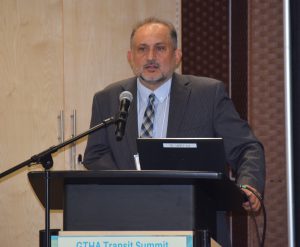The billing for the recent keynote speech by Toronto Metropolitan University (TMU) professor at the promised provocative insights and myth-busting, and Haider delivered full bore.
The professor of data science and real estate management at TMU, who also serves as the research director of the Urban Analytics Institute, spoke on the topic The Big Picture on GTHA Transit.
Conducive demographics
In his view, not all new transit is good transit; the 15 Minute City is an illogical, “idiotic concept” whose advocates have abandoned their intellect; there are “too many cooks in the transit kitchen” in the GTHA; and Toronto transit planning has often been fundamentally flawed since the 1990s.
The billion-dollar Shepherd Line that was built a generation ago has never had sufficient ridership, with many lines running at the same capacity as a typical downtown bus route, Haider said. And the current logic for the Scarborough subway extension is similarly flawed, with former mayor John Tory’s decisions clearly political and not evidence-based.
“That decision was based on political expediency,” said Haider. “John Tory is as much responsible as anybody else.”
Haider offered historical context for the major transit decisions taken 30 years ago. The overall picture, Haider said, is that the older subways that were constructed, lines one and two, were built where the demographics were conducive, with dense populations producing obvious users.
“And at some point in the ‘90s, we said, ‘OK, let’s expand, because we can expand on the success of line one and line two,’” he explained. “That’s where the mistake happens, because the demographics change. If you move out of the urban core, people have different demographics, household sizes and mobility patterns and needs where their mobilities may not be so efficient by public transit. So that’s where I think the decision to expand transit has not been very smart.
“The notion that we should spend more on transit ignores the fact that people have paid taxes, and from those taxes, you spend money, spending other people’s money…You will end up taking taxpayers’ money to build transit that’s not going to serve much people.”

The primary role for the transportation system is to enable commerce, Haider said. Other benefits are great to have, but serving the needs of labour comes first.
The thinking that transit will replace roads is nonsense, Haider believes. He said transit planning and service are a subset of transport planning; roads are critical for successful transit operations; and expanding road capacity is a must for increasing the throughput.
“Transit projects should be implemented when they serve and support the economy,” Haider wrote in his slide presentation. “We are not Europe. We will never be. Our urban demographics are different.”
Other Haider prescriptions to get mass transit back on track include:
- Create city budgetary offices, similar to the Parliamentary Budget Office
- Facilitate greater integration of transit systems
- Don’t let transit unions take over public transit planning
- Restrict Metrolinx to inter-municipal transit
- Provide predictable, sustainable transit operational financing
- Implement transit service boards. Empower citizen participation
- Revert to traditional cost-benefit analysis — avoid biased, falsely monetized calculations such as congestion savings
- Create a provincially led multi-jurisdictional transport investment authority to prioritize and justify large capital expenditures.
- “We need a lot of education, training and conversations,” said Haider. “You have City Hall and MTO and transit advocates. They all have different visions. They have people who want streetcars on every street, even if it can’t be afforded.”
Haider did say the Ontario Line is long overdue and makes sense.
His analysis differed sharply from that of the immediately previous Transport Futures speakers, Toronto Mayor Olivia Chow and federal Housing, Infrastructure and Communities Parliamentary Secretary Peter Fragiskatos.
Fragiskatos outlined details of the federal government’s $30-billion Canada Public Transit Fund, announced in July.
“Transit is, I think, a way to create strong communities where people really recognize one another,” said the London, Ont. MP. “I don’t think that is a pie in the sky idea.”
Chow called for politicians to stick to well-designed transit plans. She also praised transit’s role in building community, giving the example of a bus driver who becomes familiar with regular customers and helps seniors load baggage.
“I think we need to celebrate that more,” said Chow.
Follow the author on X/Twitter @DonWall_DCN



Recent Comments
comments for this post are closed